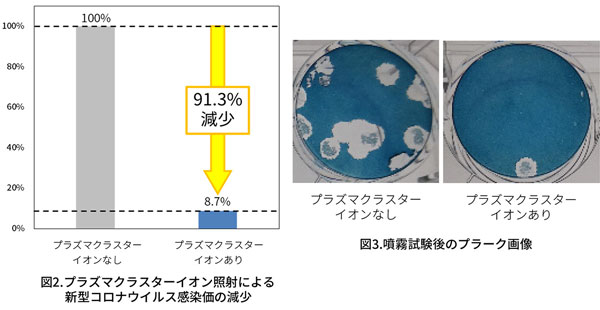
COVID-19: Demonstrate virus reduction effect: Plasmacluster technology
sharp:
In collaboration with Nagasaki University Institute for Infectious Diseases and Professor Yoshiyama of Shimane University School of Medicine, we created a virus testing device equipped with Plasmacluster technology.
For the “new coronavirus” floating in the air,
By irradiating plasma cluster ions for 30 seconds * 3,
We have demonstrated that the infection value * 4 is reduced by 90% or more.
Demonstration of effectiveness with COVID-19 virus:
2004:
Demonstrated the effect of plasma cluster technology on “feline coronavirus” of the coronaviridae family * 6,
Year 2005:
Demonstrated the effect on “SARS coronavirus (SARS-CoV)”, which has a sister relationship with “new coronavirus” * 7.
2020:
This time, we have newly demonstrated the effect on the “new coronavirus” floating in the air.
Nagasaki University Infectious Diseases Joint Research Institute:
This time, it was demonstrated that “Plasmacluster technology inactivates the new coronavirus floating in the air.”
It is expected that it will exert an antiviral effect not only in ordinary households but also in real spaces such as medical institutions.
News Release: Sharp
https://corporate.jp.sharp/news/200907-a.html
Severe acute respiratory syndrome-related coronavirus: The species and its viruses – a statement of the Coronavirus Study Group | bioRxiv
https://www.biorxiv.org/content/10.1101/2020.02.07.937862v1
Sharp says air purification technology can reduce airborne coronavirus
Sharp Corp.
said Monday that research by the firm shows its air purifying technology is able to reduce airborne novel coronavirus particles, claiming it as a world first.The Osaka-based electronics maker
said its Plasmacluster technology,which emits positive hydrogen ions and negative oxygen ions through plasma discharge, cut concentrations of novel coronavirus particles by about 90 percent
in an experiment jointly conducted with Nagasaki University and Shimane University.
Still, the makers have seen rising demand for air purifiers in the past several months.
According to the Japan Electrical Manufacturers’ Association,
the shipment value of such products between April to July jumped about 71 percent, to ¥14.9 billion, compared to the same period in the previous year.
In July, Panasonic Corp. and Daikin Industries Ltd.
said their air purification technologies could inhibit the virus when attached to a surface (as opposed to Sharp’s airborne particles).
But since their experiments were also conducted in small-scale controlled environment, how effective the equipment can be under everyday conditions is unclear.
The Japan Times
https://www.japantimes.co.jp/news/2020/09/08/business/tech/sharp-airborne-coronavirus/